Top Rankings
Iron School District ranks among the top 20% of public school district in Utah for:
Category
Attribute
Community Size
Largest student body (number of students) (Top 1%)
For the 2025 school year, there are 3 public preschools serving 445 students in Iron School District. This district's average pre testing ranking is 7/10, which is in the top 50% of public pre schools in Utah.
Public Preschools in Iron School District have an average math proficiency score of 57% (versus the Utah public pre school average of 41%), and reading proficiency score of 32% (versus the 42% statewide average).
Minority enrollment is 27% of the student body (majority Hispanic), which is less than the Utah public preschool average of 31% (majority Hispanic).
Overview
This School District
This State (UT)
# Schools
18 Schools
408 Schools
# Students
14,790 Students
195,137 Students
# Teachers
501 Teachers
9,057 Teachers
Student : Teacher Ratio
30:1
30:1
District Rank
Iron School District, which is ranked within the top 50% of all 153 school districts in Utah (based off of combined math and reading proficiency testing data) for the 2020-2021 school year.
The school district's graduation rate of 88% has increased from 86% over five school years.
Overall District Rank
#53 out of 154 school districts
(Top 50%)
(Top 50%)
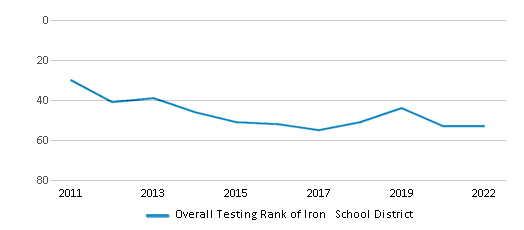
Math Test Scores (% Proficient)
(20-21)40%
39%
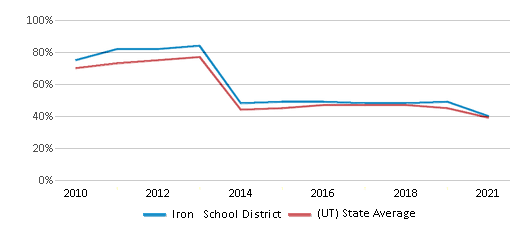
Reading/Language Arts Test Scores (% Proficient)
(20-21)44%
43%
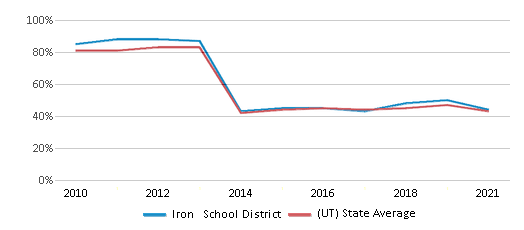
Science Test Scores (% Proficient)
(20-21)47%
45%
Graduation Rate
88%
88%
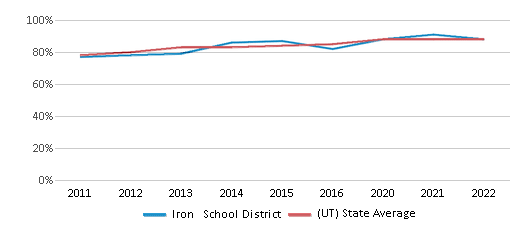
Students by Ethnicity:
Diversity Score
0.29
0.48
# American Indian Students
235 Students
2,004 Students
% American Indian Students
1%
1%
# Asian Students
145 Students
2,792 Students
% Asian Students
1%
2%
# Hispanic Students
1,577 Students
41,494 Students
% Hispanic Students
11%
21%
# Black Students
96 Students
2,695 Students
% Black Students
1%
1%
# White Students
12,354 Students
134,941 Students
% White Students
83%
69%
# Hawaiian Students
112 Students
3,551 Students
% Hawaiian Students
1%
2%
# Two or more races Students
271 Students
7,647 Students
% of Two or more races Students
2%
4%
Students by Grade:
# Students in PK Grade:
335
16,151
# Students in K Grade:
1,051
23,940
# Students in 1st Grade:
1,162
24,978
# Students in 2nd Grade:
1,193
26,403
# Students in 3rd Grade:
1,206
26,290
# Students in 4th Grade:
1,230
26,559
# Students in 5th Grade:
1,193
27,209
# Students in 6th Grade:
1,188
18,075
# Students in 7th Grade:
1,168
1,029
# Students in 8th Grade:
1,140
1,462
# Students in 9th Grade:
1,019
1,079
# Students in 10th Grade:
1,041
570
# Students in 11th Grade:
983
560
# Students in 12th Grade:
881
832
# Ungraded Students:
-
-
District Revenue and Spending
The revenue/student of $7,108 in this school district is less than the state median of $10,732. The school district revenue/student has declined by 25% over four school years.
The school district's spending/student of $6,391 is less than the state median of $10,829. The school district spending/student has declined by 25% over four school years.
Total Revenue
$105 MM
$7,309 MM
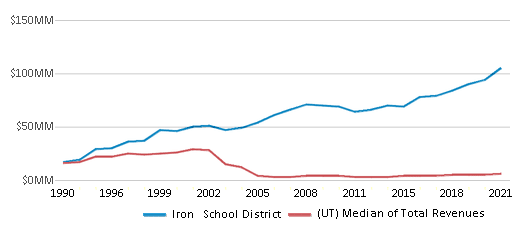
Spending
$95 MM
$7,375 MM
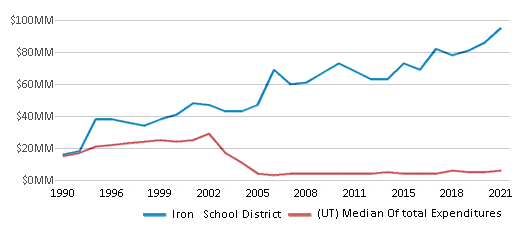
Revenue / Student
$7,108
$10,732
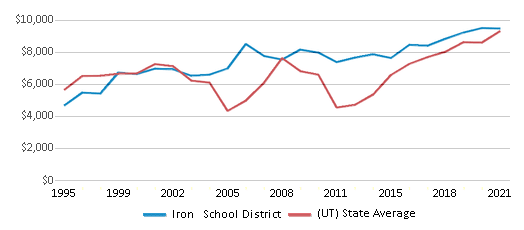
Spending / Student
$6,391
$10,829
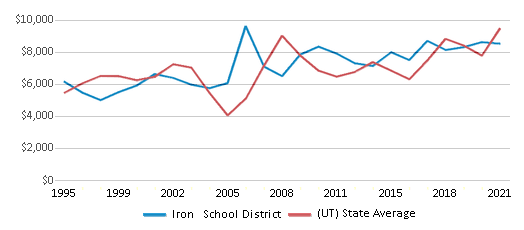
Best Iron School District Public Preschools (2025)
School
(Math and Reading Proficiency)
(Math and Reading Proficiency)
Location
Grades
Students
Rank: #11.
Escalante Valley School
(Math: 55-59% | Reading: 30-34%)
Rank:
Rank:
6/
Top 50%10
202 N Beryl Hwy
Beryl, UT 84714
(435) 439-5550
Beryl, UT 84714
(435) 439-5550
Grades: PK-6
| 139 students
Rank: n/an/a
Iron County Preschool
Special Education School
638 W 500 S
Cedar City, UT 84720
(435) 586-2801
Cedar City, UT 84720
(435) 586-2801
Grades: PK
| 200 students
Rank: n/an/a
Three Peaks Pre School
Special Education School
1521 W Midvalley Road
Cedar City, UT 84720
(435) 867-4288
Cedar City, UT 84720
(435) 867-4288
Grades: PK
| 106 students
Recent Articles

Year-Round Or Traditional Schedule?
Which is more appropriate for your child? A year-round attendance schedule or traditional schedule? We look at the pros and cons.

Why You Should Encourage Your Child to Join a Sports Team
Participating in team sports has a great many benefits for children, there is no doubt. In this article you will learn what those benefits are.

White Students are Now the Minority in U.S. Public Schools
Increasing birth rates among immigrant families from Asia and Central and South America, combined with lower birth rates among white families, means that for the first time in history, public school students in the United States are majority-minority. This shift in demographics poses difficulties for schools as they work to accommodate children of varying language abilities and socio-economic backgrounds.





